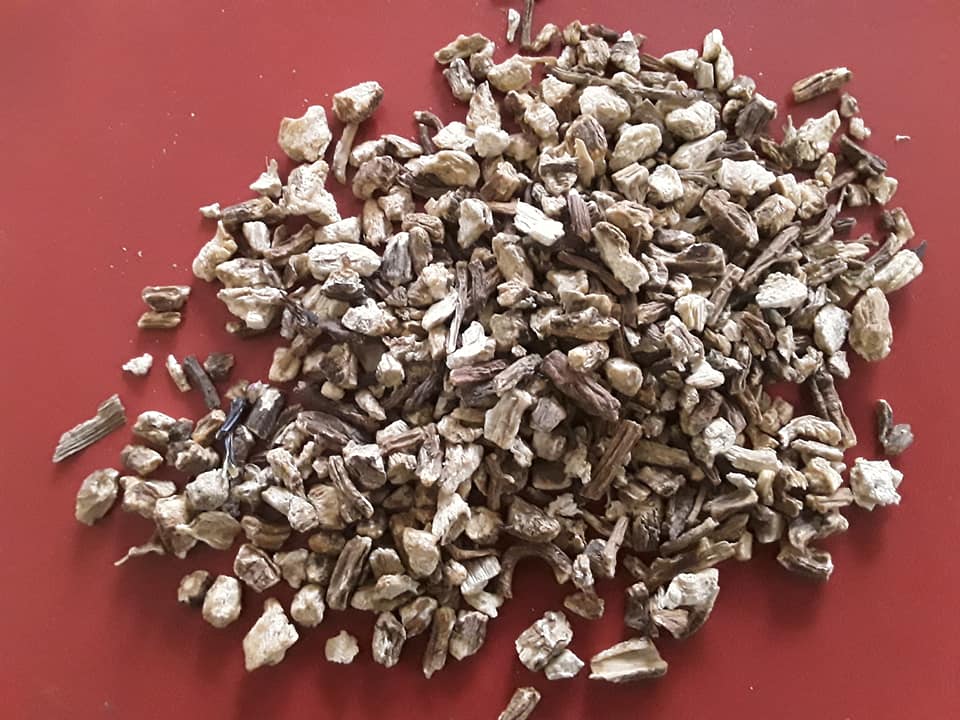
Cut Angelica Root Culinary & Healing. Angelica archangelica, syn. Archangelica officinalis. Plant Family: Apiaceae. Aka Holy Ghost Root & Archangel Root. The name Archangelica is supposed to come from the Greek word “arkhangelos”, the name of Angel Gabriel who according to myth revealed its use in medicine. The roots of Angelica are long, twisted, thick and fleshy, with many fine rootlets coming off the main root; the roots of each plant can weigh up to as much as 1.3kg and have a characteristic musk-like scent. The root is prized for its aromatic properties and is used in incense and in the perfumery industry. It is one of the ingredients of several French liqueurs including absinthe and can be used as a substitute for juniper berries when making gin. It can also be used as a fixative in pot-pourri.
Angelica is recommended by many modern as well as ancient writers for use in skin care.
- Angelica contains nutrients, such as antioxidants, vitamins, valeric acid, volatile oils and many others, which are helpful for the natural treatment of various skin conditions.
- It relieves pain and swelling.
- It eases PMS symptoms, using angelica can prove to be a blessing for women suffering from menstrual cramps. It helps to balance the level of hormones, which in turn provides relief from severe pains.
- Mouth sores can be reduced by proper use of Angelica herb. It has antimicrobial properties that helps to get rid of the microbes that causes sores in the mouth.
- Because of its bactericide properties it heals a sore throat. You can just chew an angelica stem, but because it is bitter, gargle with a tea made from the dried root with a little honey in it.
- Angelica herb helps women’s reproductive health.
- Regular use of angelica herb can help with hair loss. Use cold herb tea as a final rinse. The Vitamin E content stimulates circulation of oxygen in the blood of the scalp and encourages the regeneration of damaged hair cells.
- A cup of angelica tea prior to sleep has been found to help insomnia and giving a restful night’s sleep.
- Angelica plant can cure Dyspepsia that which shows as heartburn, too much gas, and tummy bloating. This herbaceous plant is considered to have flatus-relieving constituents, which facilitates alleviation of gas and puffiness. The pulp of the root can be used as a medicine for digestion; as a result, consuming it as recommended can be beneficial to keep your digestive tract functioning properly.
- Angelica herb can help reduce anxiety. Sip a lovely cup of angelica root tea and relax.It will help to release the stress in the brain and reduces anxiety.
- It is a very traditional process to use this herb normalise blood pressure.
- A bath can be prepared by adding 2 cups of Angelica infusion to the warm water. Coconut oil can also be added for obtaining the best results. Having this bath relieves inflammation, softens the skin and helps to treat eczema.
- Tea prepared from the dried leaves and roots may perhaps stimulate appetite.
- The oil that is extracted from angelica herb is perfect to release the stress from muscles and thus reduces the ache. Either add a tea to your bath or some dried root humg in a muslin bag over the hot tap as you run your bath.
There are innumerable Ayurvedic health benefits of Angelica. Also there are many historical uses and benefits of Angelica. Infusions made from the leaves and roots of the angelica plant can help in the treatment of depression by triggering the production of mood enhancing chemicals in the brain. Angelica tea is used as tonic, used to restore vigour and vitality after sickness. It can be especially beneficial for arthritis. And of course it also has culinary uses.
To make Angelica tea or decoction, boil a teaspoon of dried root for 10 minutes. Let it steep and strain.
Store in a glass jar for later consumption. Drink 1 cup after meals or three times a day. You can add other herbs or honey to improve the efficacy and taste.
Angelica should not be used by pregnant women or nursing mothers. Avoid using angelica root concurrently with warfarin. If you are taking prescribed drugs or have any ongoing health problems, please talk to your healthcare provider first. Always thoroughly research any new herb you are thinking of using. Do your homework.
